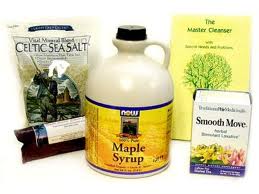Are you about to drink lemon-water-syrup-cayenne pepper juice for 10 days to “cleanse” your system? Do you plan to eat nothing but vegetables for two weeks to “rid your body of toxins?” Or maybe buy an expensive juicer so you can have liquid meals & supplements for the month of January and “shed excess fat?”
If the answer to these questions is yes, let me save you an enormous amount of hunger, misery, money, and time spent on the toilet: Cleanses and detox diets don’t work. They’re essentially just fasts, and the only thing they guarantee is that the people who invent them are going to make a lot of money.
“Wait!!” you say, “But I’ve been so indulgent and mean to my body during the holiday season–and maybe all of 2009–that I need to ‘start fresh’ and rid my body of the evil things I put in it for so long!!”
I know how you feel. And I don’t blame you for wanting to try something drastic in an attempt to rid yourself of the gluttonous feeling and get on track with losing weight. But the truth is, along with every other mammal, you have a built-in detox system. It’s called a liver, kidneys, lungs, and skin. These powerful organs work round-the-clock to protect you and make sure that whatever you’ve ingested that doesn’t serve you is excreted. This is the only detox system you need.
Not only will a cleanse or detox not do what it promises, but it can also cause harm to your body. When you flush out “bad stuff” from your body, you’re also flushing out good stuff, like vitamin & mineral stores, and the good intestinal bacteria that keep your digestive system healthy. Also, the “flushing” of your body’s insides means you’ll likely have frequent gas and diarrhea, which can quickly lead to dehydration, the breakdown of skin on your bottom, and hemorrhoids. It sounds gross…and it is.
In addition to unpleasant symptoms, these types of diets severely restrict your calories, to a level that can cause headaches, fatigue, irritability, body aches, inability to think clearly, and overall lethargy. Your ability to exercise during a cleanse is severely compromised — and detox diets is so low in protein that you won’t be able to rebuild lost muscle tissue.
You will probably lose weight during your diet (because of the severe calorie restriction), but studies have shown that you will not only gain the weight you lose back, but you’re likely to gain more than you lost once you start eating normally again.
Now, if you’ve gained some chub over the holidays due to your intake of cookies, prime rib, and cocktails, then doing something to jump start your new year is not a bad idea. The something (moderation) is not as sexy as a cleanse, but it works, lasts, and won’t leave you starting your new year on the pot. Here’s what I’d recommend:
- Cut back on sweets, processed snacks, and meat. You could even give these foods up for two weeks, to allow your body to readjust to a new healthy routine, and to reduce cravings. Just don’t plan to give these up completely for too long–it won’t last.
- Eliminate alcohol, or or reduce your consumption to 1-2 drinks per weekend, and no alcohol during the week.
- Reduce your reliance on caffeine. If you feel you need a little, limit yourself to one cup of coffee or tea in the morning, then stick to caffeine-free beverages for the rest of the day. You’ll adjust after a week or so, and will sleep better and have more natural energy.
- Eat more fruits and vegetables. This does not mean add lettuce to your cheeseburger, but rather replace some of what you’re eating now with vegetables. If you normally have meat, mashed potatoes, and a vegetable for dinner, replace the potatoes with another lower calorie vegetable and choose a leaner meat.
- Don’t drink your calories. Stick to water and other calorie-free beverages like sparkling water, herbal tea, iced tea, and the occasional diet soda if you’re craving a treat.
- Avoid doing anything extreme. If you give up foods you love completely, you won’t stick to your new healthy lifestyle plan. You’ll eventually (probably sooner rather than later) revert to your old habits, and you’ll gain weight back, feel fatigued, get lazy, etc.
- Take baby steps. It takes time to make changes that become habits. From this list, pick something you’ll start with and go from there. Make mini-goals that are specific and realistic so you don’t feel overwhelmed. For example: this week I will eat primarily vegetarian meals. Or, this week, I won’t bring any unhealthy foods into my house, to reduce temptation.
Eating in moderation is the only way to maintain a healthy weight and healthy lifestyle in the long run.





No Comments